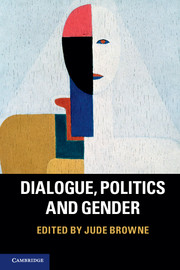Book contents
- Frontmatter
- Contents
- List of contributors
- Acknowledgements
- Introduction
- 1 Women and the standpoint of concrete others
- 2 Gender, discourse and non-essentialism
- 3 Universalism in feminist international ethics
- 4 Language, gender, dialogue, ethics
- 5 Between consensus and deconstruction
- 6 Trapped in a family portrait?
- 7 Gender, gesture and garments
- 8 What kind of dialogue do we need?
- 9 Deliberation, domination and decision-making
- Index
- References
1 - Women and the standpoint of concrete others
From the criticism of discourse ethics to feminist social criticism
Published online by Cambridge University Press: 05 August 2013
- Frontmatter
- Contents
- List of contributors
- Acknowledgements
- Introduction
- 1 Women and the standpoint of concrete others
- 2 Gender, discourse and non-essentialism
- 3 Universalism in feminist international ethics
- 4 Language, gender, dialogue, ethics
- 5 Between consensus and deconstruction
- 6 Trapped in a family portrait?
- 7 Gender, gesture and garments
- 8 What kind of dialogue do we need?
- 9 Deliberation, domination and decision-making
- Index
- References
Summary
Que nous veulent les lois du juste et de l’injuste?
Baudelaireγυμνωτέος δη πάντων πλην δικαιοσυνύνης
PlatoFrom the mid 1980s onwards an influential strand of feminist criticism of Rawls arose from a confluence of Gilligan’s moral psychology and Sandel’s communitarian critique which was subsequently turned against a certain kind of moral theory, including Habermas’s discourse ethics. In particular, Benhabib’s distinction between the standpoint of the generalised other and the standpoint of the concrete other was crucial to this debate and inspired many to follow this critical path. In my view, however, this distinction is misconceived, and the interpretation of Habermas’s discourse ethics to which it gives rise, mistaken. At best, it leads Benhabib to develop criticisms of Habermas’s conception of the moral standpoint, some of which are valid, though in need of further specification. However, neither these valid criticisms of discourse ethics, nor, I believe, the broader feminist critique of moral theory are obviously germane to feminism, and it remains unclear to this day how they advance the practical aims of feminist social criticism, such as the overcoming of ongoing injustice and the emancipation from patriarchal oppression.
- Type
- Chapter
- Information
- Dialogue, Politics and Gender , pp. 13 - 51Publisher: Cambridge University PressPrint publication year: 2013

